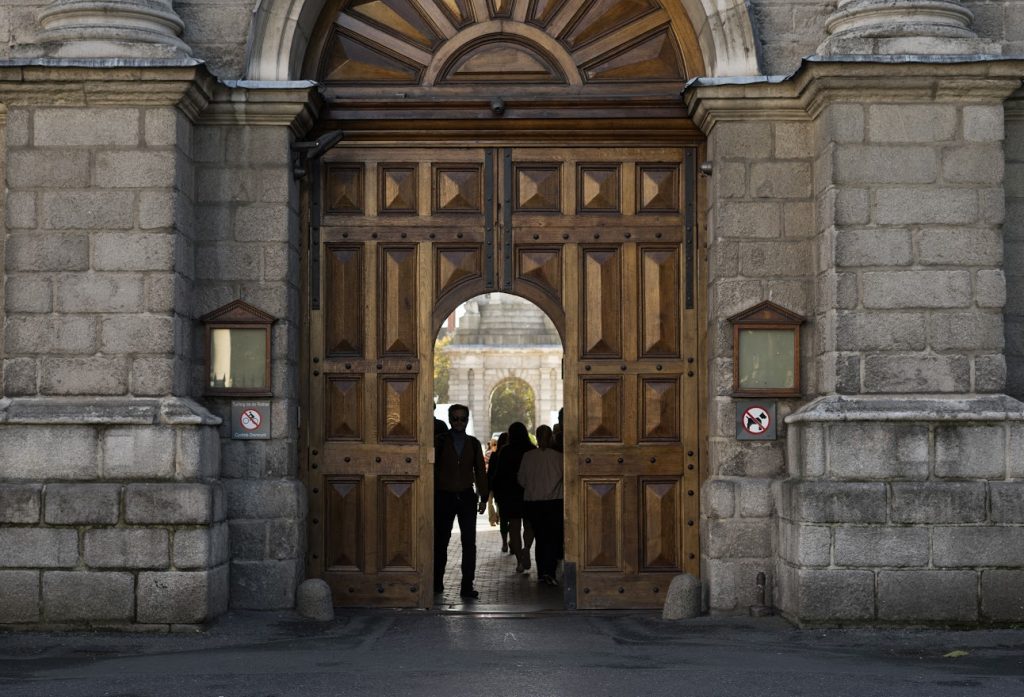Despite their differences, Trinity’s on-campus accommodation and Dartry Halls share a number of similarities. You share living spaces with your friends and peers. If you want to have more than eleven people in your apartment at one time, you have to request permission as it constitutes a “party”. And in order to access your apartment and bedroom, you are subjected to Trinity’s woefully inefficient keycard system.
Trinity uses the same magnetised keycards for entry to both on campus and halls residences. These keycards are extremely sensitive, and often break due to being “demagnetised”. This demagnetisation occurs when keycards come into close proximity with anything that emits a magnetic field. Student residents learn relatively quickly that having your keycard in the same pocket as your phone, or in your wallet next to bank cards, is a fatal error as it can easily lead to your keycard becoming demagnetised. Luckily, the College has a great system in place, whereby if your keycard breaks you can have it replaced in the Accommodation office, in Front Gate or at main reception in Trinity Hall. From the outside looking in, it sounds like nothing could go wrong.
However, as on-campus and halls residents will know, the keycard system is anything but simple and efficient. Theoretically, it should be manageable for students to avoid leaving their keycard near their phone or wallet. But students are human beings, not infallible robots. In practice, the system is a nightmare for both students and staff alike.
While it may be easy to leave your keycard in your bag during the daytime, what’s the solution for a student who is on a night out? If you can’t leave it near your phone or wallet, which many students under the influence inevitably do anyway, the only solution is to keep it in an awkward back pocket. This leads to numerous keycards becoming accidentally misplaced, mixed up, or demagnetised by something other than a phone or bank card. Security staff on campus and in halls are driven demented by the incessant keycard replacement requests that occur like clockwork throughout the night.
“The keycard system is inarguably at fault, and yet, in classic Trinity style, the problem is left to fester and accumulate year upon year.”
In the accommodation office, which is open during office hours on weekdays, staff spend hours each day replacing dozens of keycards that have become demagnetised. Some students will lose or demagnetise multiple keycards in the space of a few days, and accommodation staff have no choice but to continue the bizarre repetitive ritual of replacing the keycards and warning against the magnets in phones or bank cards. One staff member informed me that even my earphones could be the cause of demagnetisation because there are tiny magnets to be found “everywhere.”
The keycard system is inarguably at fault, and yet, in classic Trinity style, the problem is left to fester and accumulate year upon year. Professional staff have their time wasted dealing with the monotonous task of keycard replacement, and students are constantly affected as they are locked out of their residences, often late at night, and forced to wake up housemates or walk across campus to solve a problem that shouldn’t even exist in the first place.
Trinity markets itself as innovative, with one of the slogans for the latest Inspiring Generations campaign reading: “Dangerous ideas positively encouraged.” Such a slogan is at odds with the reality of the student experience on campus, where systems are often outdated and “dangerous ideas” of upgrading and change are rarely “encouraged.” If anything, it seems to be the opposite: year after year, staff and students complain about the inefficiency of the keycards, and yet no attempts are made to update it.
It’s not as if changing the system would require some groundbreaking scientific feat that would cost millions of euros. Every student has a Trinity ID card, for example, that is programmable to be able to open certain doors around campus. These cards are resistant to demagnetisation, so students wouldn’t have the unnecessary worry of leaving them near their phone or wallet. If the student cards weren’t an option, switching to a classic key fob is another simple solution. Again, key fobs are resistant to demagnetisation, which would save students and staff an inordinate amount of time and effort.
“It is an outdated, inefficient system, that has been perpetuated because it is likely seen as “too expensive” to change.”
In hundreds of other university accommodation halls across the world, different key systems are used in order to avoid the demagnetisation problem. There is no rule or stipulation stating that Trinity must use the specific magnetic strip keycards that it does. It is an outdated, inefficient system, that has been perpetuated because it is likely seen as “too expensive” to change.
Known as low-coercivity cards, the keycards used in Trinity accommodation are typically used in hotels and other short-term accommodation. Because they take less energy to produce and to encode data onto, they’re a cheaper card to produce and replace, but also more susceptible to demagnetisation. The decision to continue to use these cheaper cards is inextricably linked to cost- and corner-cutting on Trinity’s behalf. Rather than spending the money needed to fix the problem, in true Trinity fashion, the situation is ignored and brushed under the carpet.
For an institution that presents itself as the home of cutting edge ideas and “excellence,” Trinity has a remarkably long list of recurring outdated systemic issues that are severely at odds with the college’s “cutting-edge” public image. This is a college that will spend 170,000 euro on wine over the course of two years, and yet will subject its residents and staff to infuriatingly backwards systems on the grounds of saving money.
Another slogan for the Inspiring Generations campaign reads: “Innovators and disruptors welcome.” The keycard situation illustrates just how hypocritical this “innovative” image presented by Trinity truly is.






